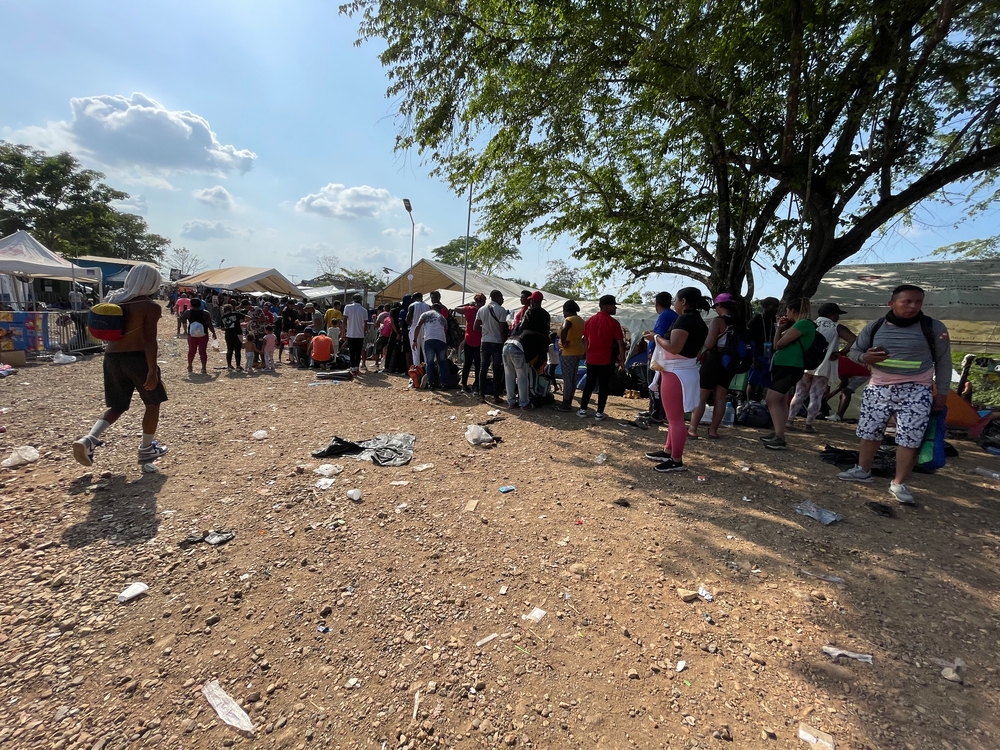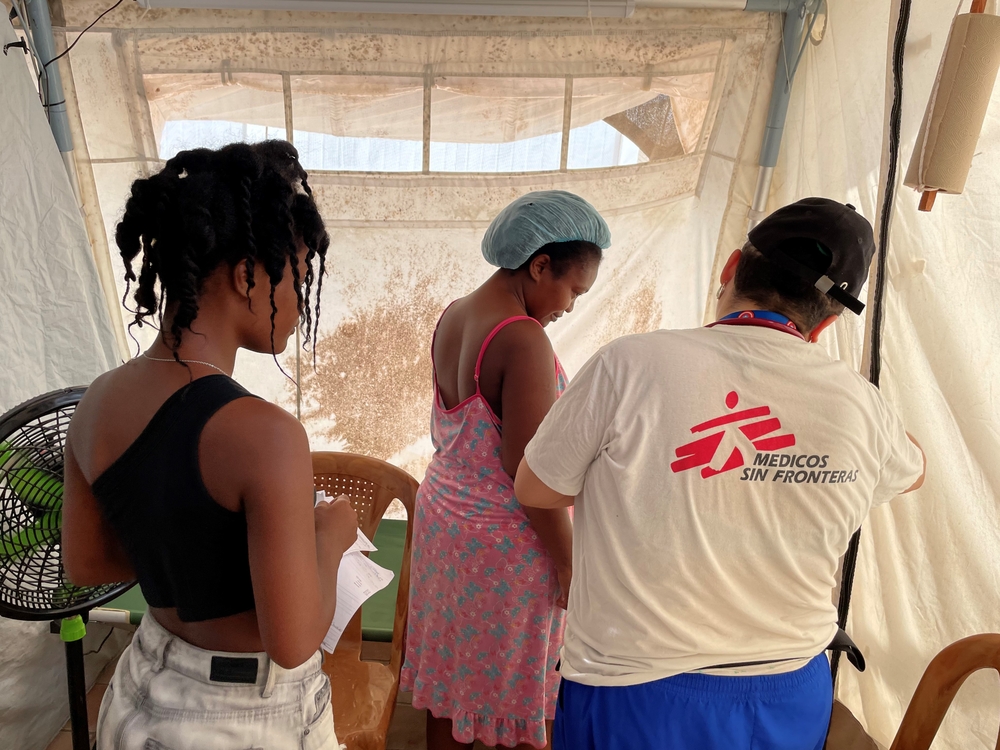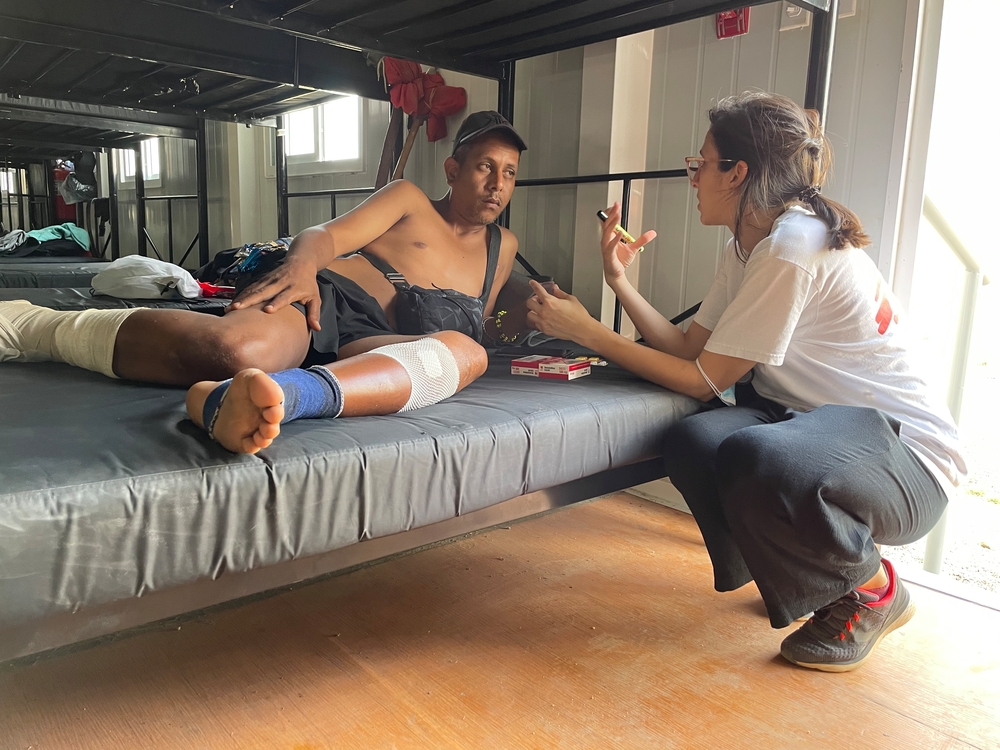Panama: Migrants with pregnancy, chronic diseases and disabilities crossing the treacherous Darién Gap in search of safety

Between January and May 2023, 166,649 people risked their lives to cross from Colombia to Panama on foot through the Darién Gap—a fivefold increase from the same period in 2022. Médecins Sans Frontières teams providing care to migrants in southern Panama who survived the dangerous journey are extremely concerned about the inadequate protection, hygiene, and basic services provided.
Sam Antoine is the youngest migrant at the temporary reception centre in San Vicente, in southern Panama’s Darién province. Lying on an MSF emergency stretcher, the eight-day-old baby moved his little feet and hands and, from time to time, blinked opened his eyes to look at his mother, Merlande, who was standing next to the local MSF doctor who caring for them both.
Merlande is 39 years old. She is originally from Haiti but fled two years ago due to violence. Until recently, was working as a domestic cleaner in Chile. “The cost of living is very high there,” said Merlande. “Everything is expensive, food, rent. Without [legal] papers, you cannot get a good job. We tried to legalize our situation; it was impossible.”
Desperate to leave Chile in search of better opportunities, she decided her only option was to cross the Darién Gap—a treacherous stretch of Jungle that connects North and South America between. She was eight months pregnant. Travelling with two women, their husbands, and two girls, they spent four-days in the jungle climbing up cliffs, crossing rising rivers, and passing through areas controlled by criminal groups before finally arriving in Panama.
More than 166,600 migrants have crossed the Darién Gap between January and May 2023, five times more than the same period in 2022. Approximately 65 percent of migrants are Venezuelan or Haitian, but more than 25 nationalities have been registered, including Ecuadorian, Chinese, Chilean, Indian, Afghan, and Syrian. Most say their destination is the United States.
“In the jungle they stole US$1,300 from us,” said Merlande. “They left us without any money. They robbed us in Colombia and in Panama.” Merlande emphasized that they were “only robbed”, knowing that many others who took that route before her were kidnapped, raped, or murdered.
Despite MSF and multiple other humanitarian organizations, and Colombian and Panamanian government agencies repeatedly raising the alarm about the dangers of this stretch of the migration route, there is still no safe and dignified alternative. People trying to seek safety continue to have no other option but to cross the Darién Gap, risking violence at the hands of criminal groups, drowning, fractures, gastrointestinal illness, and skin diseases.

Health issues are not deterring migrants
When Merlande finally arrived in Panama, she was diagnosed with preeclampsia—a serious pregnancy complication that causes high blood pressure and can be fatal—and had to delivery her baby early by caesarean section.
Merlande is one of many pregnant women who have made the crossing into Panama. Between January and April 2023, MSF carried out 499 antenatal consultations at the two temporary migrant reception centres in Darién.
"We have seen an increase in diagnoses of chronic conditions that need special treatment: people with heart disease; people who need insulin; people with blood pressure problems; and people who faint due to [extreme heat], lack of food, or severe dehydration. Their health does not seem to be a determining factor for people when deciding whether to embark on the route to the United States. We have seen migrants [who cannot walk], [have] cerebral palsy, and who have dementia.” said MSF doctor, Priscila Acevedo.
Between January and April 2023, MSF treated 669 people for chronic conditions such as diabetes, high blood pressure, and asthma—more than double the same period in 2022. MSF has also noticed an increase in older adults and people with disabilities, including amputations and visual impairment.
Carlos*, a 62-year-old migrant from Colombia, has diabetes, high blood pressure, and heart problems. Sitting in the waiting room of the health post in Lajas Blancas, he cried when he told MSF staff about two days where all had to eat was a couple of biscuits. “I thought at various times that my heart was not strong enough to [survive] the path,” said Carlos. “It is something that I do not wish on anyone, not even on my worst enemy."
Reception centres beyond capacity
“Excuse me, where can I get some drinking water?” asked a 6-year-old Venezuelan girl. But there isn't any.
The 30,000-litre water tank is not enough to serve the approximately one thousand migrants who arrive daily at the reception centre in Lajas Blancas. The centre has 51 wooden huts designed to accommodate 255 migrants, but between January and April, the centre hosted as many as 1,500 people at one time. The centre in San Vicente is also operating well above capacity.
The overcrowded sleeping conditions contribute to the spread of disease, and MSF has seen an increase in the number and severity of people with pneumonia and diarrhea.
In February 2023, at least 39 migrants died in a bus crash while being transferred from the Darién temporary reception centres to the Planes de Gualaca centre, in Chiriquí, in western Panama on the border with Costa Rica.
People who cannot afford the US$40 ticket to Chiriquí sat for free in the aisles. To avoid further accidents due to overcrowding, the Panamanian authorities temporarily prohibited these free spaces.
In April, MSF learned about the case of Kelly, a 33-year-old Colombian migrant, who began her journey after surgery for a broken hand. When she arrived at the reception centre in San Vicente her hand was infected. “They took me to the hospital and said that I had to see the orthopedic surgeon and have an X-ray, but I was afraid that they would leave me there, without money or communication, so I left,” said Kelly.
Kelly was promised that there would be a daily bus for the most vulnerable people. “A bus for those who had no money, those who were raped,” said Kelly. “They put me on a list, but there were no free seats. I've been here a week and I'm going to keep waiting."
Kelly was traveling with a friend and her three children. None of them could pay US$40 to get to the border with Costa Rica because on the way they were attacked twice.
“In the first attack, about 30 armed men who spoke another language came and grabbed whoever they could,” said Kelly’s friend who wished to remain anonymous. “They wanted to take my 6-year-old boy, so I grabbed him and started running, and they shot at me. But the second time, we could not save ourselves. They appeared on the other side of the river when we were crossing it. Where were we going to run to?” They were left with only a few clothes and a cell phone that the armed group did not see.
Currently, a free bus leaves every 10 days to transport people who have been stranded at the reception centre for more than 10 days, and every now and then space is opened for people with special vulnerabilities, although the criteria are not yet very clear.
An accumulation of needs
José Rafael Cumare fractured his heel when he fell in the jungle. “About an hour after crossing into Panama, I jumped into a waterfall and there was a stone under the water and I hit and fractured my foot,” he said as an MSF staff member checked swelling in his leg. He crawled and dragged himself along the path before building crutches with some branches to complete the journey, which took him 13 more days. These difficulties are aggravated by the rainy season, which has just begun. According to the National Migration Service, at least 10 people died on the route through the Darien Gap in the last two weeks of April.

MSF once again calls on the Colombian and Panamanian authorities to guarantee safe and decent routes for migrants. Seeking safety is not a crime. In addition, MSF reiterates that access to basic services for migrants sheltering in the host communities and temporary migrant reception centres must be expanded and improved. Security, decent sleeping facilities, drinking water and food, hygiene and sanitation, and access to legal services must also be ensured.
MSF is a medical humanitarian aid organization that has provided medical and mental health services since April 2021 to migrants who arrive in Panama through the Darién Gap. Currently, MSF is working in the temporary migrant reception centres of Lajas Blancas and San Vicente, and is preparing to start working in the indigenous community of Bajo Chiquito.





Leave a Comment